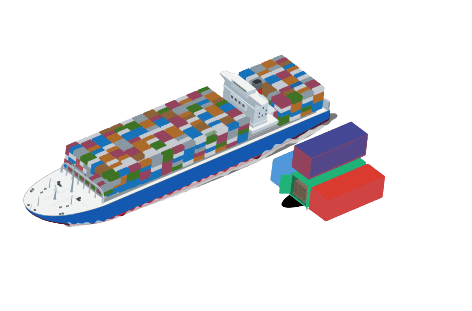Coastal shipping is a mode of maritime transportation that involves the movement of goods between ports within the same country. The term “coastal shipping” derives from the name Sebastião Caboto, a Venetian navigator who explored the North American coast in the 16th century. This activity can also occur on rivers and lakes, and when it involves coastal navigation between two or more countries, it is referred to as international coastal shipping.
In the Brazilian context, coastal shipping plays a strategic role due to the country’s extensive coastline, which stretches for over seven thousand kilometers. Furthermore, coastal shipping is one of Brazil’s oldest economic activities, dating back to the colonization era between the 16th and 19th centuries. Since then, it has been an economical and essential logistical alternative for transporting goods across the national territory.
Coastal Shipping in Brazil: Trends and Perspectives
In recent years, coastal cargo transportation in Brazil has experienced significant growth. According to Adalberto Tokarski, director of the National Agency of Waterway Transportation (Antaq), the volume transported by coastal shipping increased by over 200% in a decade, between 2010 and 2019. In the year 2020, just in the months of January and February, 179 million tons of cargo were transported.
Despite this increase, the volume is still considered low in comparison to the extent of the Brazilian coastline. Coastal shipping in the country is still predominantly limited to the transportation of petroleum, which accounted for 75% of the total cargo handled between 2010 and 2016, according to the Brazilian Development Bank (BNDES).
Restrictions and Incentives for Brazilian Coastal Shipping
Brazilian legislation on waterway transportation imposes various protectionist restrictions on coastal shipping. These restrictions aim to protect the naval industry, foster the national merchant marine, and ensure national security through fleet protection.
To address these limitations and stimulate the growth of coastal shipping in Brazil, the “BR do Mar” program was created. This initiative aims to rebalance the Brazilian transportation matrix, develop coastal shipping, and reduce costs, with the goal of making the Brazilian economy more efficient. The program also seeks to facilitate the formation of a national fleet, ensuring that Brazilian coastal shipping is not dependent on fluctuations in the international market. Law 14.301/2022, signed by President Jair Bolsonaro, regulates the “BR do Mar” program.
Advantages and Disadvantages of Coastal Shipping
Coastal shipping offers several economic advantages, especially in the Brazilian context. The main advantages include:
- Lower fuel consumption per transported ton.
- Reduced cost per ton-kilometer transported.
- Lower accident rate compared to road transport.
- Lower environmental impact, making it a more sustainable option.
- Reduction of freight and insurance costs.
- Higher security against cargo theft.
Despite these advantages, coastal shipping also faces challenges, including longer delivery times due to the legislation and bureaucracy involved in cargo clearance. Additionally, restrictions on the use of foreign-flagged vessels can also limit operations on certain routes.
Conclusion
Coastal shipping is a highly important mode of maritime transportation for Brazil, given its extensive coastline and the opportunities it offers for efficient cargo movement within the country. Despite the challenges faced, the growth of coastal shipping and the encouragement of the “BR do Mar” program represent a promising outlook for the future of this activity. Smart utilization of coastal shipping can contribute to the optimization of national logistics, cost reduction, and a lower environmental impact, making it a key factor in the development of Brazilian foreign trade.
What is Cheap2Ship?
Get to know Cheap2Ship, a technology company specialized in logistics and foreign trade. Through our advanced freight management and quoting platform, medium and large companies have experienced a significant increase in operational efficiency and a reduction in logistics costs.
Our commitment is to provide greater transparency in the costs related to current freight providers, such as carriers, freight agents, and transport companies. With this, our clients can make more informed and strategic decisions for their businesses.
To learn more about our innovative solutions, visit our website and follow us on social media. There, you will find relevant content about foreign trade, logistics, and supply chain. We are ready to drive the success of your company in the global market. Join us and discover how we can make a difference for your business.

